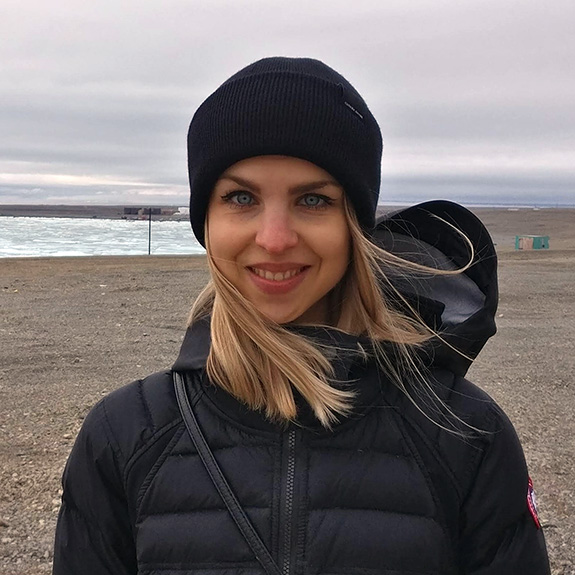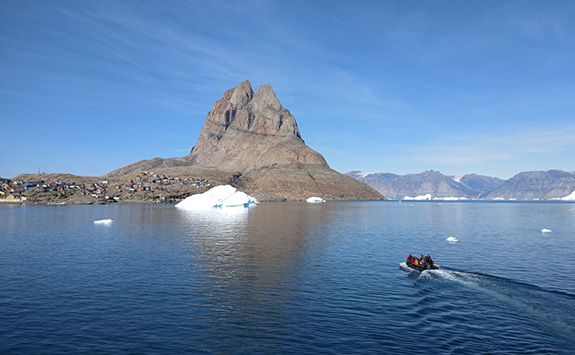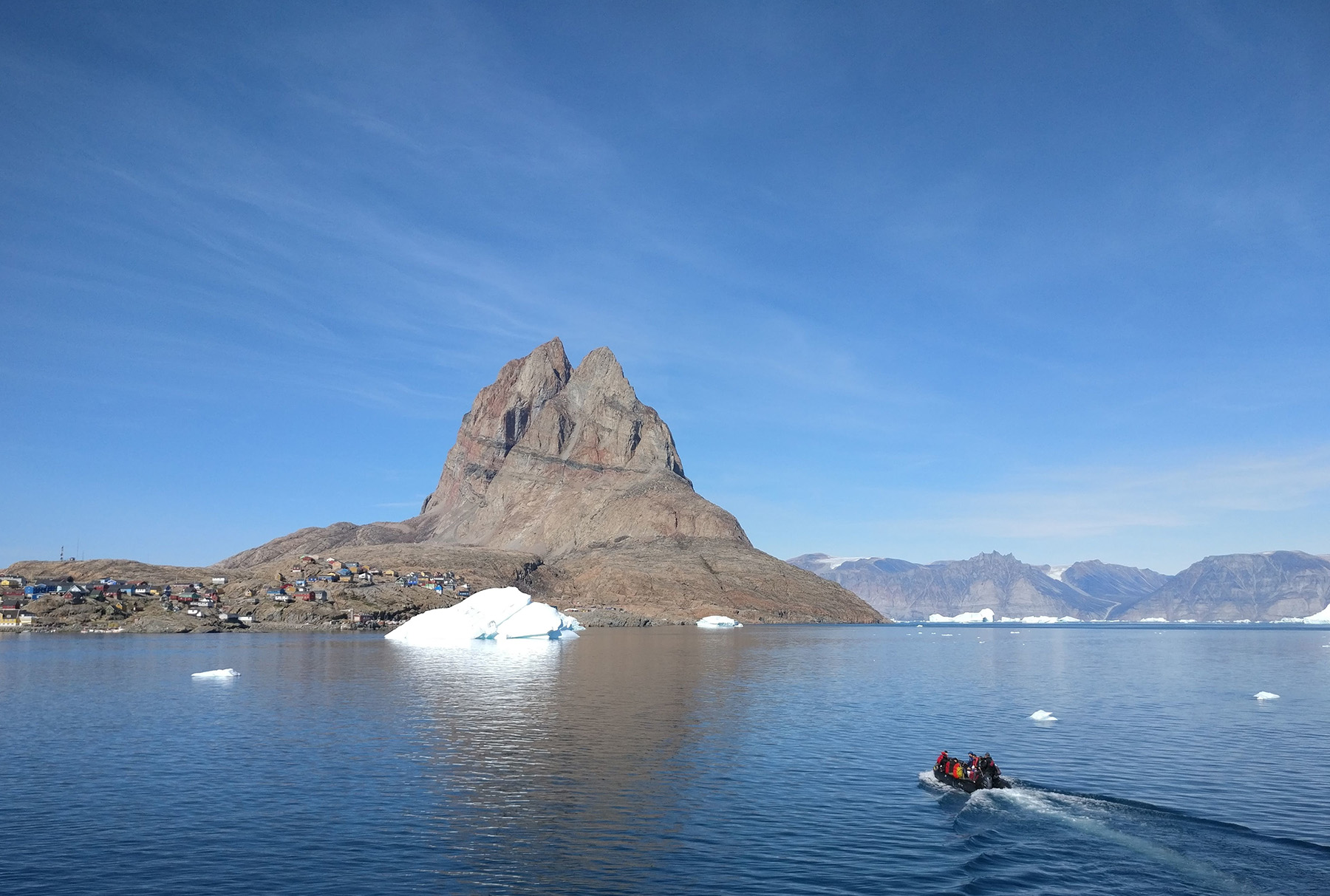Climate Change in the Arctic Through a Geopolitical Lens
Written by Jelaine Gan and Sheena Davis
2 September 2024
In a wrap
- Dr Ingrid A. Medby explores critical polar geopolitics focussing on state identity and examining how individuals perceive their connection to the Arctic.
- The Arctic is experiencing climate change at a faster rate compared to the global average, resulting in impacts to the region and externally.
- Interdisciplinary collaboration to address challenges like climate change and ecosystem resilience is key.
Geopolitics is a subfield of human geography and political geography, which, to put it simply, looks to understand the interplay between geography and politics, or space and power. Although it sounds a bit abstract and technical, geopolitics is central to many national and international issues such as those relating to war, territorial disputes, and resource conflicts. Critical geopolitics focuses more closely on the nuanced and multifaceted interactions between human dynamics and the physical environment, and within academia, the focus is to gain a deeper understanding of how these interactions influence and are influenced by political decisions and instances of discourse.
To understand more, we sat down with Dr Ingrid A. Medby, a senior lecturer in the School of Geography, Politics and Sociology, to hear more about her work in political geography and specifically critical polar geopolitics.
Delving into critical polar geopolitics
For Ingrid, the interplay between political power and geographical space is one of the aspects of critical geopolitics that she finds the most interesting. Her research largely focuses on critical polar geopolitics, and specifically delves into the concept of 'state identity' and how state officials and representatives from communities in the region perceive their role and identity as part of an Arctic state.

The Arctic is a geographical area that is often associated with preconceived images of snow, ice and polar bears; however, it is a region that encompasses much more than that. The Arctic is often defined by the Arctic Circle and encompasses eight countries. These countries, known as the Arctic states, have territories within this latitudinal boundary and hold unique rights within the Arctic Council. This forum for intergovernmental cooperation has eight member states and includes six permanent participants, the Indigenous peoples’ organisations who are consulted on the decision-making process for the region. Ingrid highlighted that “it's quite a unique institution in that sense. I think, when it comes to climate change or environmental issues in general in the Arctic the Indigenous people are listened to and maybe more so on those topics.”
One of the important aspects of Ingrid’s research looks at understanding how politicians and civil servants from these member states, whose capital cities are often situated far from the boundaries of the Arctic Circle, perceive their Arctic identity. For example, while Norway is an Arctic state, its capital, Oslo, lies south of the Arctic Circle. Similarly, the US is considered an Arctic state due to Alaska, despite Washington D.C. being far removed from the Arctic. Her work explores how these officials understand their connection to the Arctic and how this shapes their political decisions.
So where does climate change fit in?
An Arctic report in 2004 brought to the forefront the severity of climate change and its impacts in the region and led to an increase in international engagement and cooperation. Ingrid highlighted that climate change plays out at a much faster rate in the Arctic region which is warming at least four times faster than the global average - and the ramifications of this are also felt elsewhere due to the interconnectedness of global systems. Consequently, many countries in Asia, such as China and India, have set up research stations in the region in the interest of understanding the impacts of climate change, and also have economic interest in natural resource potential, shipping line shortcuts, and other investment opportunities.
The impacts of climate change are increasingly being felt by the people who call the Arctic Circle their home, threatening their way of life. For example, some of the Indigenous Sami people rely on reindeer herding as a traditional way of life, but milder temperatures and increased rainfall cause layers of hard ice to form when the temperature drops again, which prevents reindeer from reaching food underneath the snow and can cause starvation. Reindeer herders are then forced to provide supplemental food, which is costly and unsustainable. In another example given by Ingrid, the migratory patterns of fish are being altered thus impacting those communities that rely on this resource for their livelihood. Resultingly, many political decisions, negotiations, and collaborations in the Arctic are largely framed by the issue of climate change and its associated impacts.
Part of Ingrid’s research looks to understand climate change, its impacts and the mitigations put in place in the context of the political and social sphere. As she put it, “Even when you're not talking about climate change, you kind of are indirectly because you know everything is changing up there and that is due to climate change.”
Circling back to the Arctic
Having grown up in Northern Norway, Ingrid’s research is to some extent interlinked to her heritage, and she became more aware of how the Arctic was viewed from the outside when she moved to Australia. She explained, “I became conscious of how my hometown and region was seen from the outside and reflected on what it means coming from the Arctic, what that means to other people versus maybe how I experienced it myself.” Coinciding with Ingrid’s increased interest in the perception of the Arctic both to the outside world and within the region itself, there was also a growing international interest in the Arctic. From the late 1990s, the Arctic began to garner international attention largely for resource reasons but also because of the pressures experienced by the region due to climate change. For her master’s research, Ingrid examined the way people from her region perceived the Arctic and their role within it, focussing on national identity and nationalism and how that played out through the Arctic. To become more involved in policy, Ingrid began working at the North Norway European Office, a regional representation office in Brussels. However, the love of academia attracted her to return and pursue her PhD, and she has continued to progress within this sector.

Currently, Ingrid sits as a representative on the International Arctic Science Committee’s social and human working group, an organisation that coordinates Arctic science and research and advises on scientific priorities for the region. Throughout her career, Ingrid has engaged with many exciting opportunities and experiences; she recounted one experience where she was invited as a member of the teaching staff on an Arctic expedition led by a Canadian charity called Students on Ice. During this two-week-long expedition along the coast of Greenland, across the Davis Strait, and into the Northwest Passage, students had the opportunity to immerse themselves in issues surrounding the Arctic and climate change, learning a range of topics such as biodiversity, research methods, and geopolitics. For Ingrid, this was an amazing opportunity to engage the youth on issues of climate change but also learn about different fields of science.
A push for interdisciplinarity moving forward
In a discussion about Ingrid’s predictions for the future of her field, she highlighted the importance of an interdisciplinary approach to tackle many of the societal challenges that we are facing. Working in the Arctic sphere and contributing to various committees, Ingrid has collaborated with many scientists outside her own discipline. As she explained, "I think, not just in Arctic geopolitics, but more broadly, we all need to get better at interdisciplinarity, and some people do it really well already. But I think in general in academia we tend to work within our disciplines and measure our success within our disciplines, but, with a lot of these global challenges that we have, including climate change and ecosystem resilience, we have to have that more holistic view. So, you can't think about policy without knowing something about natural systems and you can't think about human well-being without thinking of the ecosystem and so on."
